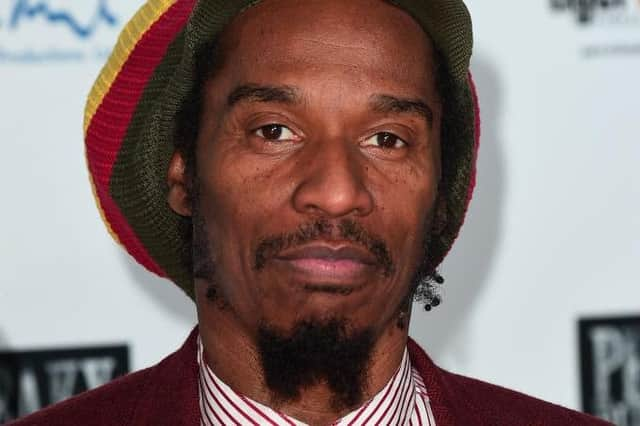Scotsman Obituaries: Benjamin Zephaniah, ‘the James Brown of dub poetry’


Benjamin Zephaniah’s adopted surname, meaning “the Lord has treasured”, was bestowed on him as a boy by church elders who felt his eloquent words had a prophetic edge. However, this treasured performance poet and author considered himself a British “griot” after the West African storyteller class and, following his death aged 65, has been hailed by the Black Writers’ Guild as “a titan of British literature” and by fellow musician Billy Bragg as “our radical poet laureate”.
The “James Brown of dub poetry” wanted to reach those who didn’t read books and made his name as a performance poet, often accompanied by the Benjamin Zephaniah Band.
Advertisement
Hide AdAdvertisement
Hide Ad“I think poetry should be alive,” he told the Times in 2004. “You should be able to dance to it.”
Still, as a result of his published works – poetry collections, novels and plays for adults and children – he was listed as one of Britain’s Top 50 post-war writers and went on to become Professor of Poetry and Creative Writing at Brunel University.
His literary achievements were all the greater because he left school aged 13, unable to read or write due to his dyslexia. Decades later, his work is a staple on the national curriculum.
Zephaniah was a lover of language and languages. He was influenced by the oral tradition of Jamaica, but was also a fan of Keats and Shelley, choosing the Poetical Works of Shelley as his Desert Island book in 1997.
He advocated for Welsh and Cornish to be taught in schools, studied Mandarin and latterly lived between Beijing and Lincolnshire, saying he “lives in two places, Britain and the world”.
As a performer, he once managed to gig on every continent in the space of three weeks but was also a regular small screen presence, playing street preacher Jeremiah “Jimmy” Jesus in Peaky Blinders for nearly a decade and making many appearances on Question Time.
He was a gentleman who identified as an anarchist, his political views shaped partly by his formative experiences of racism and the prison system.
He was a staunch anti-apartheid and animal rights campaigner, having adopted veganism in his teens. The homepage of his website called simply for “no state, no monarchy. More books, more anarchy”.
Advertisement
Hide AdAdvertisement
Hide AdZephaniah was a recipient of many honorary doctorates from the Universities of Birmingham, Exeter, Hull and North London and the Open University among others, but he publicly rejected the offer of an OBE, telling The Big Narstie Show in 2020 that “I've been writing to connect with people, not to impress governments and monarchy. Could I then accept an honour that puts the word Empire on to my name? That would be hypocritical.”
Zephaniah was born Benjamin Obadiah Iqbal Springer and brought up in Handsworth, Birmingham, aka “the Jamaican capital of Europe”, with his twin Velda and six other younger siblings.
His postman father Oswald hailed from Barbados and mother Leneve, a nurse, from Jamaica, and the young Benjamin was brought up in the tradition of dub poetry, with an emphasis on rhythm as much as meaning.
He was performing his own poetry from the age of 11 but his teenage years were disruptive. His mother fled her abusive husband with Benjamin in tow. Following his expulsion from Broadway School, he was sent to approved school and was imprisoned in his late teens for burglary.
He made a fresh start in his early twenties, moving to London and publishing his first volume of poetry, Pen Rhythm, in 1980.
Zephaniah came to prominence at a time when the National Front was gaining traction, and the sus laws were disproportionately applied to young black men.
Zephaniah himself was stopped and searched for the audacity of buying a nice car with the money earned from his poetry. Little wonder that his next publication, The Dread Affair: Collected Poems, had some choice words for the British legal system.
One of his best-known poems, Dis Policeman Keeps On Kicking Me to Death, featured on his second album Rasta. Released in 1982, it was his only Number One record – in Yugoslavia – but was more notable for marking the first appearance by The Wailers since the death of Bob Marley, while the track Free South Africa did not go unnoticed by Nelson Mandela who, on his release from Robben Island, requested a meeting with Zephaniah and asked him to host the Two Nations Concert at the Royal Albert Hall in 1996.
Advertisement
Hide AdAdvertisement
Hide AdHe published his first volume of poetry for kids, Talking Turkeys, in 1994, followed up two years later by Funky Chickens, while his debut novel Face, about a teenager who suffers facial injuries in a car crash, was inspired by an encounter with Falklands War veteran Simon Weston.
His second novel, Refugee Boy, published in 2001, won the Portsmouth Book Award. Both novels were later adapted as stage plays, the latter by Zephaniah’s poetry peer and friend Lemn Sissay.
Subsequent novels Gangsta Rap (2004) and Teacher’s Dead (2007) dealt with urban violence, while We Are Britain! (2002) promoted a more positive portrait of cultural diversity. Arguably, his most fascinating work was his autobiography, The Life and Rhymes of Benjamin Zephaniah, published in 2018 when he was 60.
Zephaniah married first wife Amina in the late Eighties; they divorced in 2001. In 2017 he married Qian Zheng, who broke the news that he had passed away a mere eight weeks after being diagnosed with a brain tumour. She survives him, along with his siblings and mother.
Obituaries
If you would like to submit an obituary (800-1000 words preferred, with jpeg image), or have a suggestion for a subject, contact [email protected]